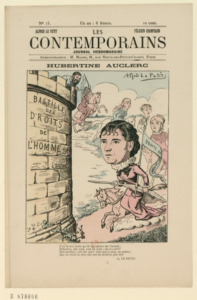The Docket celebrates the end of an eventful and enriching 2019. We lead off with a major addition to our mission to develop and improve the teaching of legal history, presenting a guide to digital research resources (and how to guide students in their use), originally presented to a pre-conference workshop at the 2018 American Society…
Issue: Volume 2, Issue 4 (December 2019)

Sally Hadden: Digital Tools for Legal History Research
Editor’s Note: This article was developed from Sally Hadden’s presentation on research resources for legal history students from the 2018 American Society for Legal History meeting.[i] The Docket thanks Professor Hadden for working with us to develop online teaching resources. We also thank her for her patience as this project has come to press! Follow…
“Masculine Tyranny” and the Women’s Jury
In nineteenth century France, women organized to demand the right to sit on criminal juries as a matter of fairness and equity. Activists argued that a jury of “peers” required that female defendants, at least, should be judged by female jurors, or else justice was denied. After reformers tried the usual political routes – such…
McNeil Center Fellowships: Research Opportunity for Doctoral Researchers in Early Americas
The McNeil Center for Early American Studies is offering at least eight research fellowships for dissertation-stage graduate students who would benefit from one semester or nine months in residence in Philadelphia and access to library, archival, or museum collections in the area. While the McNeil Center supports work in multiple disciplines and historical fields, legal…
Friends in All the Right Places: The Newest Legal History
The Docket is presenting this article by permission of the Omohundro Institute of Early American History and Culture, which published it on its Uncommon Sense blog in October, 2019. In 1965 a lawyer named Malcolm S. Mason wrote an article for the Journal of Legal Education with a simple problem: legal history was boring. For…
The 2019 ASLH Annual Meeting on Twitter
If you missed the ASLH meeting in Boston, or weren’t able to follow the social media discussion, fear not. We have the most insightful, provocative and popular Twitter conversations here. Can 140 characters reshape your view of legal history?

